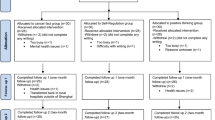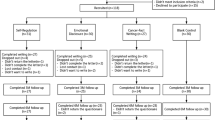Abstract
Purpose
The aim of this randomized clinical trial was to examine the efficacy of Pennebaker’s expressive writing intervention (EWI) in improving the perceived quality of life (QoL) and in reducing psychiatric symptoms among patients who received a cancer diagnosis.
Methods
Seventy-one consecutively recruited patients who received a cancer diagnosis for the first time in their life were randomized into two groups: an EWI group (EWG: n = 35) and a control group (CG n = 36). At the baseline, anamnestic information was collected for all patients, and the patients completed a series of self-reported measures assessing psychiatric symptoms, alexithymia, and health-related QoL. A modified Pennebaker’s EWI adapted to cancer diagnosis was also administered to the EWG. Six months later, 32 patients (EWG: n = 17, CG: n = 15) participated in the follow-up and filled out the same questionnaires.
Results
The Pennebaker’s EWI was effective in decreasing global psychopathology (d = -.55). Small but significant effects were also observed for alexithymia levels and health-related QoL, with the EWG showing a reduction in alexithymia levels (d = -.31) and an increase in the mental component of QoL (d = .31) compared to the CG.
Conclusions
Our findings indicate that the Pennebaker’s EWI is effective in reducing the negative impact of cancer diagnosis on patients’ mental health.

Similar content being viewed by others
References
Casellas-Grau A, Ochoa C, Ruini C (2017) Psychological and clinical correlates of posttraumatic growth in Cancer. A systematic and critical review. Psychooncology 26(12):2007–2018. https://doi.org/10.1002/pon.4426
Hermelink K, Bühner M, Sckopke P, Neufeld F, Kaste J, Voigt V, Münzel K, Wuerstlein R, Ditsch N, Hellerhoff K, Rjosk-Dendorfer D, Braun M, Von Koch FE, Härtl K, Hasmüller S, Bauerfeind I, Debus G, Herschbach P, Mahner S, Harbeck N (2017) Chemotherapy and post-traumatic stress in the causation of cognitive dysfunction in breast cancer patients. J Natl Cancer Inst 109(10). https://doi.org/10.1093/jnci/djx057
Cardoso G, Graca J, Klut C, Papolia A (2016) Depression and anxiety symptoms following cancer diagnosis: a cross-sectional study. Psychol Health Med 21(5):562–570. https://doi.org/10.1080/13548506.2015.1125006
Lo C, Zimmermann C, Rydall A, Walsh A, Jones JM, Moore MJ, Shepherd FA, Gagliese L, Rodin G (2010) Longitudinal study of depressive symptoms in patients with metastatic gastrointestinal and lung cancer. J Clin Oncol 28(18):3084–3089. https://doi.org/10.1200/JCO.2009.26.9712
Bottomley A, Gaafa R, Manegold C, Burgers S, Coens C, Legrand C, Vincent M, Giaccone G, Van Meerbeeck J (2006) Short-term treatment-related symptoms and quality of life: results from an international randomized phase III study of cisplatin with or without raltitrexed in patients with malignant pleural mesothelioma: an EORTC lung-cancer group and National Cancer Institute, Canada, intergroup study. J Clin Oncol 24(9):1435–1442. https://doi.org/10.1200/JCO.2005.03.3027
Hollen PJ, Gralla RJ, Liepa AM, Symanowski JT, Rusthoven JJ (2004) Adapting the lung cancer symptom scale (LCSS) to mesothelioma: using the LCSS Meso conceptual model for validation. Cancer 101(3):587–595. https://doi.org/10.1002/cncr.20315
Rodin G, Yuen D, Mischitelle A, Minden MD, Brandwein J, Schimmer A, Marmar C, Gagliese L, Lo C, Rydall A, Zimmermann C (2013) Traumatic stress in acute leukemia. Psychooncology 22(2):299–307. https://doi.org/10.1002/pon.2092
Taylor S, Harley C, Campbell LJ, Bingham L, Podmore EJ, Newsham AC, Selby PJ, Brown JM, Velikova G (2011) Discussion of emotional and social impact of cancer during outpatient oncology consultations. Psychooncology 20(3):242–251. https://doi.org/10.1002/pon.1730
Moore S, Darlison L, Tod AM (2010) Living with mesothelioma. A literature review. Eur J Cancer Care 19(4):458–468. https://doi.org/10.1111/j.1365-2354.2009.01162.x
Taylor GJ, Bagby RM, Parker JDA (1997) Disorder of affect regulation. Alexithymia in medical and psychiatric illness. University Press Cambridge, Cambridge
Wise TN, Mann LS, Mitchell JD, Hryvniak M, Hill B (1990) Secondary alexithymia: an empirical validation. Compr Psychiatry 31(4):284–288. https://doi.org/10.1016/0010-440X(90)90035-Q
Schimmenti A, Caretti V (2018) Attachment, trauma, and alexithymia. In: Luminet O, Taylor GJ, Bagby RM (eds) Alexithymia: advances in research, theory, and clinical practice. Cambridge University Press, Cambridge, pp 127–141
Messina A, Beadle JN, Paradiso S (2014) Towards a classification of alexithymia: primary, secondary and organic. J Psychopathol 20:38–49
Holland JC, Breitbart WS, Butow PN, Jacobsen PB, Loscalzo MJ, McCorkle R (2015) Psycho-oncology, Third edn. Oxford Medicine, Oxford
Osborn RL, Demoncada AC, Feuerstein M (2006) Psychosocial interventions for depression, anxiety, and quality of life in cancer survivors: meta-analyses. Int J Psychiatry Med 36(1):13–34. https://doi.org/10.2190/EUFN-RV1K-Y3TR-FK0L
Frattaroli J (2006) Experimental disclosure and its moderators: a meta-analysis. Psychol Bull 132(6):823–865. https://doi.org/10.1037/0033-2909.132.6.823
Frisina PG, Borod JC, Lepore SJ (2004) A meta-analysis of the effects of written emotional disclosure on the health outcomes of clinical populations. J Nerv Ment Dis 192(9):629–634. https://doi.org/10.1097/01.nmd.0000138317.30764.63
Merz EL, Fox RS, Malcarne VL (2014) Expressive writing interventions in cancer patients: a systematic review. Health Psychol Rev 8(3):339–361. https://doi.org/10.1080/17437199.2014.882007
Smyth JM (1998) Written emotional expression: effect size, outcome types, and moderating variables. J Consult Clin Psychol 66(1):174–184. https://doi.org/10.1037/0022-006X.66.1.174
Jensen-Johansen MB, Christensen S, Valdimarsdottir H, Zakowski S, Jensen AB, Bovbjerg DH, Zachariae R (2013) Effects of an expressive writing intervention on cancer-related distress in Danish breast cancer survivors. Results from a nationwide randomized clinical trial. Psychooncology 22(7):1492–1500. https://doi.org/10.1002/pon.3193
Mosher CE, Duhamel KN, Lam J, Dickler M, Li Y, Massie MJ, Norton L (2012) Randomised trial of expressive writing for distressed metastatic breast cancer patients. Psychol Health 27(1):88–100. https://doi.org/10.1080/08870446.2010.551212
Zachariae R, O'Toole MS (2015) The effect of expressive writing intervention on psychological and physical health outcomes in cancer patients- a systematic review and meta-analysis. Psychooncology 24(11):1349–1359. https://doi.org/10.1002/pon.3802
Craft MA, Davis GC, Paulson R (2013) Expressive writing in early breast cancer survivors. J Adv Nurs 69(2):305–315. https://doi.org/10.1111/j.1365-2648.2012.06008.x
Henry EA, Schlegel RJ, Talley AE, Molix LA, Bettencourt BA (2010) The feasibility and effectiveness of expressive writing for rural and urban breast cancer survivors. Oncol Nurs Forum 37(6):749–757. https://doi.org/10.1188/10.ONF.749-757
Jensen-Johansen MB, O'Toole MS, Christensen S, Valdimarsdottir H, Zakowski S, Bovbjerg DH, Jensen AB, Zachariae R (2018) Expressive writing intervention and self-reported physical health out-comes–results from a nationwide randomized controlled trial with breast cancer patients. PLoS One 13(2):1–17. https://doi.org/10.1371/journal.pone.0192729
Solano L, Donati V, Pecci F, Persichetti S, Colaci A (2003) Postoperative course after papilloma resection: effects of written disclosure of the experience in subjects with different alexithymia levels. Psychosom Med 65(3):477–484. https://doi.org/10.1097/01.PSY.0000035781.74170.F1
Bunevicius A (2018) Personality traits, patient-centered health status and prognosis of brain tumor patients. J Neuro-Oncol 137(3):593–600. https://doi.org/10.1007/s11060-018-2751-6
Granieri A, La Marca L, Mannino G, Giunta S, Guglielmucci F, Schimmenti A (2017) The relationship between defense patterns and DSM-5 maladattive domains. Front Psychol 8:1–12. https://doi.org/10.3389/fpsyg.2017.01926
Pennebaker JW (1997) Opening up: the healing power of expressing emotions. Guilford Press, New York
Pennebaker JW (1985) Traumatic experience and psychosomatic disease: exploring the roles of behavior, obsession and confiding. Can Psychol 26(2):82–95. https://doi.org/10.1037/h0080025
Pennebaker JW, Beall SK (1986) Confronting a traumatic event: toward an understanding of inhibition and disease. J Abnorm Psychol 95(3):274–281
Pennebaker JW (2010) Expressive writing in a clinical setting. Indep Pract 30:23–25
Derogatis LR (1994) SCL-90-R symptom Checklist-90-R administration, scoring and procedures manual. Pearson, Minneapolis
Prinz U, Nutzinger DO, Schulz H, Petermann F, Braukhaus C, Andreas S (2013) Comparative psychometric analyses of the SCL-90-R and its short versions in patients with affective disorders. BMC Psychiatry 13(104):1–9. https://doi.org/10.1186/1471-244X-13-104
Ware JE Jr, Sherbourne CD (1992) The MOS 36-itemshort-form health suvery (SF-36): I. Conceptual framework and item selection. Med Care 30(6):473–483
McHornery CA, Ware JE, Raczek AE (1993) The MOS 36-item short-form from health survery (SF-36): II. Psychometric and clinical test of validity in measuring physical and mental health constructs. Med Care 31(3):247–263
Bagby RM, Parker JDA, Taylor GJ (1994) The twenty-item Toronto alexithymia scale-I. Item selection and cross-validation of the factor structure. J Psychosom Res 38(1):23–32
Bagby RM, Taylor GJ, Parker JDA (1994) The twenty-item Toronto alexithymia scale-II. Convergent, discriminant, and concurrent validity. J Psychosom Res 38(1):33–40
Morris SB (2008) Estimating effect sizes from pretest-posttest-control group designs. Organ Res Methods 11(2):364–386. https://doi.org/10.1177/1094428106291059
Cohen J (1988) Statistical power analysis for the behavioral sciences, Second edn. Lawrence Earlbaum, Hillsdale
Thompson B (2007) Effect sizes, confidence intervals, and confidence intervals for effect sizes. Psychol Sch 44(5):423–432. https://doi.org/10.1002/pits.20234
Pennebaker JW, Smyth JM (2016) Opening up by writing it down: how expressive writing improves health and eases emotional pain. Guilford Press, New York
Bucci W (1997) Psychoanalysis and cognitive science. A multiple code theory. Guilford Press, New York
Schimmenti A (2017) The trauma factor: examining the relationships among different types of trauma, dissociation, and psychopathology. J Trauma Dissociation. https://doi.org/10.1080/15299732.2017.1402400
Low CA, Stanton AL, Bower JE, Gyllenhammer L (2010) A randomized controlled trial of emotionally expressive writing for women with metastatic breast cancer. Health Psychol 29(4):460–466. https://doi.org/10.1037/a0020153
Author information
Authors and Affiliations
Corresponding author
Rights and permissions
About this article
Cite this article
La Marca, L., Maniscalco, E., Fabbiano, F. et al. Efficacy of Pennebaker’s expressive writing intervention in reducing psychiatric symptoms among patients with first-time cancer diagnosis: a randomized clinical trial. Support Care Cancer 27, 1801–1809 (2019). https://doi.org/10.1007/s00520-018-4438-0
Received:
Accepted:
Published:
Issue Date:
DOI: https://doi.org/10.1007/s00520-018-4438-0




